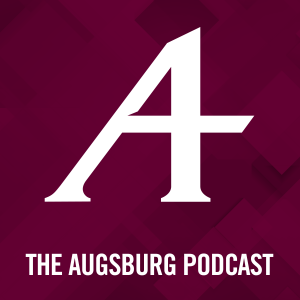The Augsburg Podcast

Marty Stortz: Interpreting the Unknown
Marty Stortz: [Charism 00:00:00] is a word that means gift. The gifts of the spirit, the Greek word is [charismata 00:00:06]. What are the gifts that Augsburg has that are part of its DNA? Every Auggie leaves knowing that we are called Auggies. And it's not we are called Auggies, it's we are called, period, Auggies. That's that sense of calling where you really are aware of being and seeing others as neighbors.
Paul Pribbenow: Questions without clear answers. The negative spaces outside the lines. Marty [Stortz 00:00:34], Bernard M. Christiansen Professor of Religion and Vocation, and Augsburg University's first endowed chair, has a gift of her own for giving her students the authority to trust in the new and the unknown, and to find neighbors in our world's many faith traditions.
Augsburg University educates students to be informed citizens, thoughtful stewards, critical thinkers, and responsible leaders. I'm Paul Pribbenow, the President of Augsburg University, and it's my great privilege to present the Augsburg podcast, one way you can get to know some of the faculty and staff I'm honored to work with every day.
Marty Stortz: We are moving out, I think, on the cutting edge of higher education in this century. And you kind of have to break a lot of molds to do that. It's a century which religion is going to become more and more and more important, not simply the knowledge of religion, but the appreciation for its practice. And we're uniquely positioned to do that, because we practice faith here. We don't just talk about it. We also have an appreciation for the lived experiential dimension of each of these great traditions.
The thing I'd like to talk about is the Lutheran identity of this place. We did start as a Lutheran seminary. And those roots, that commitment to professional education goes back to the founding of this college. To put that professional education on top of a really sound liberal arts background is really one of the charisms of this place.
I've come to believe we're probably diverse because we're Lutheran. And that sense of you know, the neighbor being and seeing in the other the neighbor, which I think you can talk about if, if you are in the suburbs or in a rural area, but you have to live if you're in Cedar Riverside. The neighbors have been Buddhist, the Vietnamese population was here, the Mung population was here, the Shamanists. We're across from Little Earth, which is Native American spiritualities. And now the Somali Muslims. So being the neighbor in that kind of context, and also welcoming the neighbor. And partnering with the neighbor. Over a common space that we have to share. And that's a, sort of a theological grounding for our diversity.
I went to grad school in a subject that I had not had a course in at college. And I was taken under the wing of a professor who was blind, Joseph [Sidler 00:03:12]. And he made me read to him. He had all of his students read to him, but he was smart enough to figure out what they were good at and what they would most love reading to him. So he made me read to him poetry. It was both a graduate degree in poetry reading to him and having him comment on what we were reading, but an introduction to theology. And theology that has not simply a system, but an aesthetic.
He honored what I already knew, he played to what I really loved, and he simply embellished around the edges. It was really beautiful. My students read differently. I have to help them learn how to read for what I want to get out of them. So, an example of what I will do is take a text or a prayer from some of these traditions and let students annotate the text. I'll take a very brief piece of text like the first [Sura 00:04:09] of the Koran, or the story of Krishna, and [Argina 00:04:15] or Vishnu and Argina right before a great battle. And I will put it in a box with a lot of white space. An enclosed space with a lot of white space around it. And then I'll ask the students questions outside of the white space. What surprised you? (laughing) What questions do you have? What captured your imagination?
So it teaches them not only how to look at a text very carefully, but how to ask questions, feeling like they can ask questions of the text. This is not the authority, you are. Probably the most important question that I ask them is what captured your imagination. I try to show images, because a lot of students are stimulated by image. (laughing) The religious traditions have some of the most beautiful art in the world. And so to show them images of the mosque. One student came up, she was very captivated by the negative space in a mosque. What is it about negative space, and I don't know whether it was the space that she saw or the description of negative space. But it rang very deep for her. And to have that honored by someone and then used as a mirror, not as a judgment.
And then it's helpful for them to feel like they can ask questions, especially questions that we don't have an immediate answer for. To say, okay, this question does not have an answer yet. Where will we go? That's been fun.
Paul Pribbenow: That was Marty Stortz, Bernard M. Christiansen Professor of Religion and Vocation. Thanks for listening to the Augsburg podcast. I'm President Paul Pribbenow. For more information, please visit augsburg.edu.






 Visit Podcast Website
Visit Podcast Website RSS Podcast Feed
RSS Podcast Feed Subscribe
Subscribe
 Add to MyCast
Add to MyCast